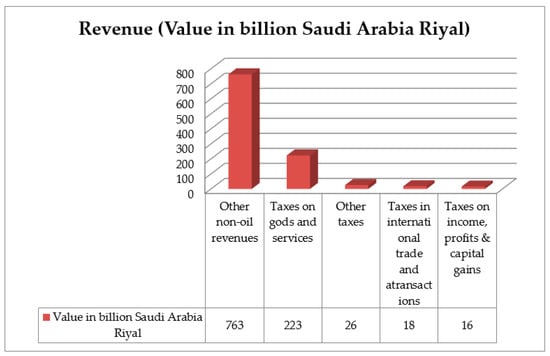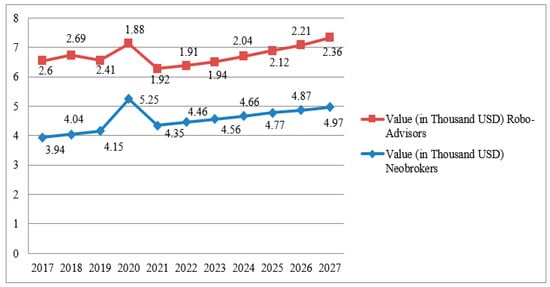Your browser does not fully support modern features. Please upgrade for a smoother experience.
Please note this is an old version of this entry, which may differ significantly from the current revision.
Subjects:
Business, Finance
Vision 2030 of Saudi Arabia is an important project that mainly targets the reduction in dependency on the oil economy through the growth of non-oil Industries.
- ambitious reform
- Vision 2030
- non-oil industry
- incentivised investment
1. Introduction
Vision 2030 of Saudi Arabia is an essential ambitious project that mainly targets the development of the non-oil industry of in country to reduce over-dependency on oil-based products. The environmental aspect of any country is determined as an essential strategy that helps maintain the sustainability of a country’s business.
Developing the financial sector for economic stability and fiscal sustainability management is crucial to this Vision 2030 [1,2]. The reform program is mainly based on the management of the non-oil sector’s performance along with improving the sustainability of business in the country. Recently, sustainability has been an essential aspect that helps maintain the environment’s health [3,4].Addressing the respective SDGs can be determined as an important aspect through which the betterment of sustainable planning can be possible for any country such as Saudi Arabia.
Figure 1 indicates that the forecast for the growth of the non-oil industry in Saudi Arabia demonstrates an approximate growth of 763 billion Saudi Riyals [5]. Therefore, Vision 2030 is essential enough, along with a selection of proper strategies for the growth of the non-oil industry for Saudi Arabia’s economic stability.

Figure 1. Non-oil industry revenue value in Saudi Arabia.
Incentivise investment is generally determined as a government-based investment policy that typically aims at the investors’ encouragement for business growth. The management of the incentivised investment in technologies can be determined as a supportive aspect of the non-oil industry growth in any country [6,7].
Figure 2 indicates that the technology-based industry growth and revenue are high enough to strongly support the non-oil industry development in Saudi Arabia.Therefore, such a strong possibility of non-oil industry development in Saudi Arabia is the leading cause for the government to support incentivized investments and the management of the ambitious reform for 2030. Stakeholder management in any large project is essential as they help provide the funds for the project’s success [8]. Henceforth, it can easily be determined that the target or Vision 2030 for the development of a complete non-oil industryand for a reduction in the oil-based industry can be supportive enough for Saudi Arabia to create a new history in its economic reform.

Figure 2. Technology growth in Saudi Arabia.
Over the last year, investment in non-oil industries in Saudi Arabia has raised GDP by 6.2%. Saudi Arabia has been regarded as the fastest-growing economic country in the private sector of non-oil. The demand has been rising sharply despite inflation, and the engagement of customers has been increasing [9]. Hence, Saudi’s non-oil industries have obtained considerable growth in finance, though they face various challenges in the global market. Both the production and demand of products have been maximized, increasing the confidence level of several manufacturing industries [10]. The Vision 2030 of Saudi Arabia depicts that different business opportunities can improve the country’s economic structure. This unique and significant vision makes the companies hunt talented employees for the correct position to acquire business goals.
2. Saudi Arabia’s Ambitious Reform Programme with Vision 2030
2.1. Introduction
Saudi Arabian Vision 2030 is considered the strategic framework for reducing the dependence of Saudi Arabia on oil, diversifying its economy, and developing the public service sector and the non-oil industry. This country aims to reform the program with Vision 2030 for economic development in the non-oil sectors. There are several types of non-oil sectors: information technology (IT), health, education, tourism, recreation, and infrastructure [17,18]. Additionally, the specific vision of the reform program is to create a vibrant society, an ambitious nation, and a thriving economy. Major building blocks to creating a rich culture involve pivotal social components such as civic engagement, community safety, equity, and social cohesion [19]. Therefore, the reform program of Saudi Arabia is the pathway toward the future.
This country’s reform program represents a profound and transformative ambitious plan for unlocking the country’s vast potential through generating a diversified, world-leading, and innovative action to provide advantages for future generations. Some specific objectives of Vision 2030 involve adequate social protection, excellent education, excellent training, and creating a transformational and authentic culture [20,21]. Additionally, the execution of the goals of Vision 2030 has some benefits that involve enhancing value in agriculture, improving the industrial structure of tourism sectors, developing financial services, improving the retail trade sector, and developing the wholesale industries of this country. Without following the objectives of Vision 2030, the country cannot improve its financial services [22]. Therefore, manufacturing for the regional market and IT-enabled services are the two sectors that give up nearly half of this country’s employment.
2.2. Advancement in Investment in the Country’s Non-Oil Industries
Incentivise investment is considered a measurement that seeks to influence the investment project by favourable tax treatment and other benefits that can affect the relative project’s costs. Additionally, Saudi Arabia has initiated its reform program for non-oil sectors by incentivizing investment in the development of economic scenarios in this country. Investment incentives have been categorized into several types: fiscal incentives, financial incentives, and other incentives involving subsidized infrastructure [23]. Therefore, investment incentives are generally encompassed to create a specific environment, facilitating foreign businesses to operate profitability and minimize risks. These incentives are usually utilized through the development of the countries to attract investments [24].
Advancement in investment in Saudi Arabia’s non-oil sectors is helping this country to become more economically stable. Financial management is a specific aspect that is responsible for creating a vibrant community [25]. Additionally, financial goals are achieved through incentivizing investment. Some investing benefits are helping meet financial goals, developing non-oil sectors, and improving the country’s economic condition [26,27]. Therefore, Vision 2030 must be implicated in the non-oil sectors in Saudi Arabia to generate new income resources. Some strategic goals of this reform program include synergistic, reinforcing design, and achieving the country’s development.
The reform program of Saudi Arabia, along with Vision 2030, is specially focused on incentivizing investment in the non-oil sectors. There are various benefits of economic incentive programs, including on-site improvements, workforce development support, property tax incentives, income incentives, and sales incentives [28]. Therefore, the government of this country should provide government incentives for the improvement of non-oil sectors.
2.3. Saudi Arabia’s Ambitious Reform Programme in Improving Non-Oil Industries
The ambitious reform program of this country for the non-oil sectors is mainly concerned with improving financial services and increasing the employment rate. Additionally, the vision of this program is to generate social and physical infrastructure that can improve the economy and give ease of living. The corporate social responsibility (CSR) model is also adequate for sustainable business operations [29]. The main approaches concerned with CSR are operational cost savings, environmental responsibility, increasing consumer loyalty, economic commitment, human rights responsibility, more substantial brand reputation, image, recognition, and philanthropic responsibility. Therefore, this sustainability framework must be included in the reform vision for developing project visibility.
Environmental, economic, and social are the main pillars of Vision 2030 [30]. However, ongoing contempt and repression are barriers to fundamental rights, affecting the non-oil sectors’ growth process. Business organizations must reduce environmental impacts by following corporate sustainability approaches [31]. Therefore, the Vision 2030 agenda aims to set a wide range of goals, such as inducing the country’s productive capacity, improving non-oil sectors as industries, enhancing social inclusion, and reducing the financial crisis. Therefore, increasing the economic performance of this country is only possible by incentivizing investment through this reform program.
This entry is adapted from the peer-reviewed paper 10.3390/su15065357
This entry is offline, you can click here to edit this entry!
